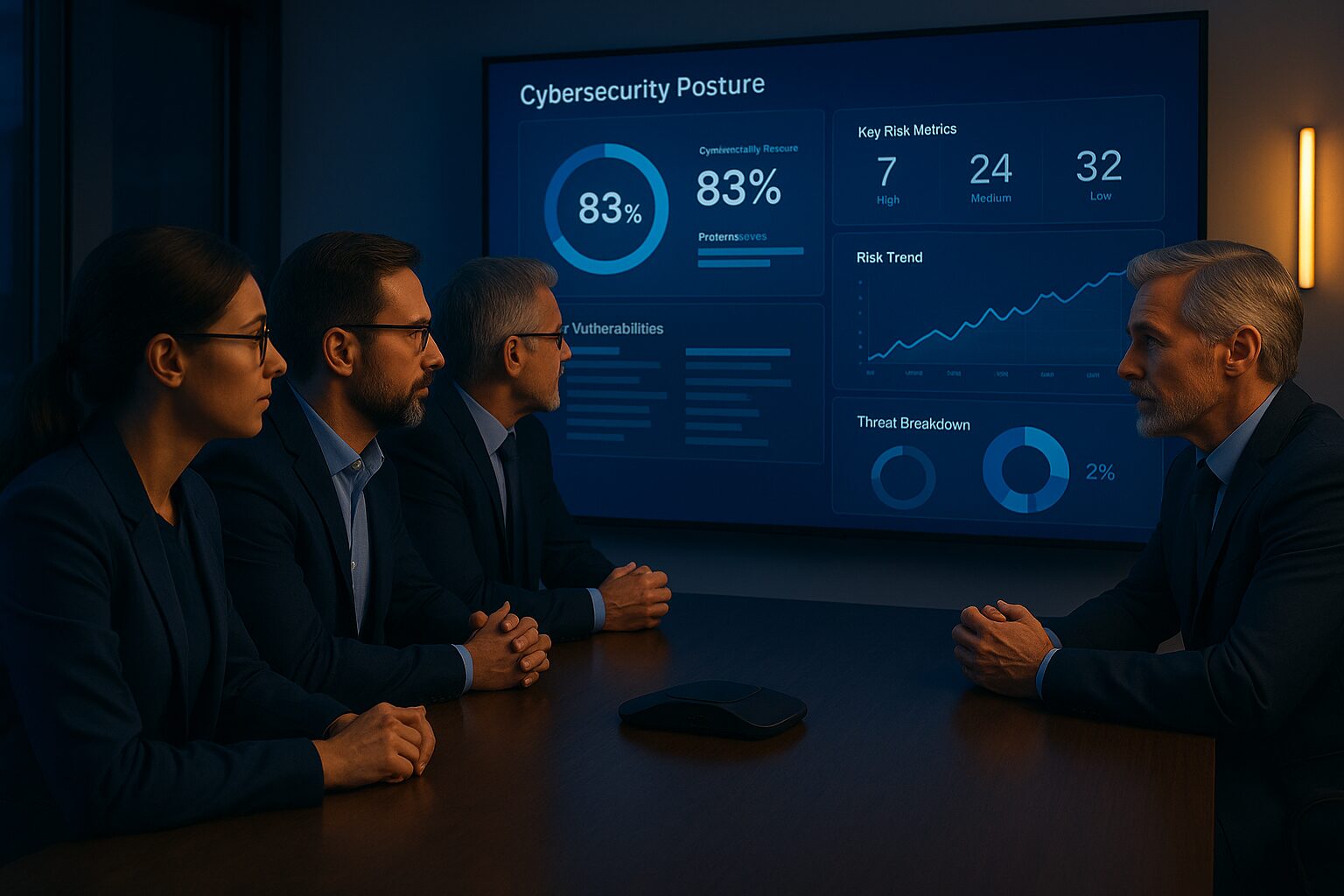If you’re an IT leader or CIO at a mid-sized healthcare practice—whether it’s an orthopedic group, dermatology clinic, urology center, or multi-physician network—you’re juggling two high-stakes challenges. First, cyber threats are no longer hitting “only the big hospitals.” In fact, 83% of physician practices have already experienced a cyberattack. Second, you face intense pressure to prove you’re protecting patient data, from ever-evolving HIPAA compliance audits to strict cyber insurance questionnaires. It’s a lot to handle, especially if your IT team is small (or one person wearing many hats). That’s where a Security Risk Assessment (SRA)—and the right SRA partner— become your secret weapons.
An SRA isn’t just a bureaucratic checkbox; it’s a thorough health check for your digital and operational security. The catch? Conducting a truly “accurate and thorough” risk assessment (as HIPAA actually requires) takes expertise and time. Many practices turn to specialized SRA partners to do the heavy lifting. But how do you choose the right partner for your healthcare organization? Below, we’ll break down why SRAs are so critical in healthcare today— for HIPAA compliance, cyber insurance, and overall cybersecurity—and what qualities to look for in a partner who can guide you through it.
By the end, you’ll know how to spot an SRA partner that not only checks the compliance boxes but truly understands the nuances of healthcare IT and keeps your practice one step ahead of threats. Let’s dive in.
HIPAA Compliance: No SRA, No Compliance (It’s That Simple)
Healthcare providers deal with extremely sensitive patient information every day, so it’s no surprise that compliance with HIPAA is non-negotiable. What some practices don’t realize until it’s too late is that conducting regular Security Risk Assessments is an explicit HIPAA requirement, not just a nice idea. The HIPAA Security Rule’s first implementation spec literally says: perform an accurate and thorough assessment of potential risks and vulnerabilities to the confidentiality, integrity, and availability of e-PHI. In plain English: you must review your risks routinely and document how you’re fixing them.
Regulators have been turning up the heat on this. The Office for Civil Rights (OCR) has ramped up enforcement, launching initiatives that penalize organizations for failing to do risk analyses. (Translation: skip your SRA, expect fines.) In one recent case, an orthopedic practice network suffered multiple ransomware attacks and ended up with a $240,000 HIPAA fine —partly because investigators found they hadn’t fully implemented required security processes. OCR’s message was blunt: “The healthcare sector needs to get serious about cybersecurity and complying with HIPAA”.
A proper SRA is your safety net here. It systematically uncovers where your practice is falling short of HIPAA’s safeguards—outdated policies, unencrypted devices, sloppy access controls, you name it—so you can correct them before auditors (or attackers) do. The right SRA partner will know the ins and outs of HIPAA. They’ll ensure nothing is overlooked, helping you avoid penalties and surprises by keeping you audit-ready with documented proof of due diligence. In short, a good SRA partner makes HIPAA compliance practical instead of painful, translating regulatory jargon into an actionable to-do list for your IT and operations teams.
Be Ready, Not Scrambling
Cyber Insurance: Strengthening Your Hand in Applications & Renewals
Beyond compliance, there’s another big driver for SRAs in healthcare: cyber insurance. If you’ve applied for or renewed a cyber liability policy lately, you know the drill—pages of questions about your security controls, from “Do you use multi-factor authentication?” to “When was your last vulnerability scan?” Insurers have wised up and are no longer insuring anyone who can fog a mirror; they want proof that you’re managing your risks. In fact, underwriters typically ask about your risk assessment process as part of evaluating your application. They essentially want to know: How well do you understand your own vulnerabilities, and what are you doing about them? If you can’t answer that confidently, your coverage could be limited or even denied.
Here’s where an SRA (and a knowledgeable SRA partner) proves invaluable. A thorough SRA will reveal whether you have the security basics insurers expect—things like strong passwords, up-to-date patching, secure backups, staff training, etc. Even better, your SRA report and remediation plan demonstrate to underwriters that you’re taking a structured, proactive approach to cyber risk. It’s evidence that you’re a lower risk to insure. This can smooth out the application process and potentially favor you in premium negotiations or policy terms. Conversely, not having an SRA (or doing only ad-hoc, informal ones) might raise red flags. Remember, many policies now require attesting to certain practices; if a claim hits and it comes out that you hadn’t “regularly assessed and mitigated” your risks, you could face coverage issues.
By partnering with an SRA provider who understands insurance requirements, you essentially get a two-for-one benefit: a compliance checkup and insurance prep. They’ll help you shore up any weak spots (e.g. “Hmm, no documented incident response plan? Let’s fix that.”) before you fill out that lengthy insurance questionnaire. This not only boosts your confidence when signing on the dotted line, but also reduces the chance of unpleasant surprises during policy renewal. In the high-stakes game of cyber insurance, an SRA partner who has your back can be the ace up your sleeve.
Stay Ahead of Threats and Insurers
Beyond Checkboxes: Bolstering Your Overall Cybersecurity Posture
While compliance and insurance are important, arguably the biggest reason to choose a solid SRA partner is to protect your practice’s operations, reputation, and patients. Healthcare breaches carry real-world pain that goes far beyond paperwork. We’re talking compromised patient records, stalled operations, and lost trust—outcomes no practice can afford. A single ransomware incident could freeze your EHR system for days, forcing you to cancel procedures or revert to pen-and-paper (chaos!). Patients might find out their personal health info was exposed, eroding the confidence they’ve placed in your practice. And let’s not forget the financial gut-punch: even smaller breaches can cost tens of thousands in recovery and legal fees, with one study finding the average incident at a small or mid-sized practice cost around $103,000.
A well-executed Security Risk Assessment is one of the best tools to strengthen your overall cybersecurity posture and prevent these nightmares. It’s like a diagnostic exam for your entire IT environment, pinpointing where you’re healthy and where you’re vulnerable. Crucially, it looks at people and processes as much as technology. Maybe it reveals that your staff need better phishing awareness training, or that your data backup routine has holes. Perhaps it surfaces neglected software updates on that imaging machine in Radiology, or overly broad user permissions on your file server. These may sound like “technical details,” but they directly translate to patient safety and business continuity risks.
The right SRA partner will frame these findings in terms of real-world impact – no fear-mongering, just facts and practical fixes. Instead of handing you a 200-page geek-speak report, they’ll highlight the key takeaways: “Here are your top 5 risks, here’s what could happen if they’re not addressed (e.g. potential PHI leak or downtime), and here’s our recommended mitigation plan.” This clarity helps you prioritize budget and effort where it truly counts. Over time, doing regular SRAs and following through on the improvements creates a cycle of continuous security improvement. Your practice becomes harder to hack and easier to audit, and you build a culture that values data protection as much as patient care.
In short, a strong SRA partner doesn’t just check your compliance boxes – they help fortify your practice against threats in a tangible way. When cyber threats are evolving by the month and targeting healthcare of all sizes, you can’t afford a “wait and see” approach. An SRA gives you a proactive game plan to stay ahead of attackers, rather than reacting after the damage is done.
Don’t Wait for a Crisis
How to Spot the Right SRA Partner for Your Healthcare Practice
Knowing you need an SRA is one thing—finding the right team to perform it is another. Not all risk assessment providers are created equal, and healthcare is a beast of its own. Here are some key factors and qualities to look for when choosing an SRA partner:
Deep Healthcare Expertise: Look for a partner who gets healthcare IT. This means familiarity with electronic health records (EHR) systems, clinic workflows, medical devices, and the privacy regulations you live under. Healthcare has unique quirks (legacy software, anyone?) and heavy compliance obligations. An SRA provider with healthcare experience will know which stones to turn—from examining how PHI flows through your practice, to checking for HIPAA-specific gaps (like missing Business Associate Agreements or improperly configured ePHI access controls). You want someone who can hit the ground running with knowledge of orthopedic practice management systems, radiology archives, HL7 interfaces, and so on—not a generalist who has to Google what an EMR is.
Comprehensive & Tailored Approach: Ask about their assessment methodology. The right partner will use a well-rounded framework (for example, NIST CSF or HIPAA Security Rule guidelines) to ensure no aspect of security is overlooked. They should be examining technical safeguards (network security, device encryption, backup processes), administrative policies (staff training, incident response plans), and physical safeguards (office security, device access) as part of the SRA. Equally important, the assessment should be tailored to your practice’s size and complexity, not a one-size-fits-all questionnaire. A 20-physician surgical group has different risks than a 2-location dermatology clinic. The right partner will scope and scale the SRA accordingly, focusing on what matters for you.
Clear, Jargon-Free Reporting: Security gibberish helps no one. You’re a busy executive or physician leader; you need clarity. A quality SRA partner provides findings and recommendations in plain language that your team (and board) can easily understand and act on. Look for someone who will give you an executive summary highlighting key risks and actionable steps, backed by detail in the appendices for your IT staff. Ask for a sample report or deliverable—if it’s 100 pages of dense techno-babble, be wary. The best partners communicate like humans, not robots, and can explain issues without making you feel lost. (Pro tip: During initial talks, note if they explain their services clearly. How they talk now is how they’ll write later.)
Actionable Guidance and Support: The end goal of an SRA isn’t a report—it’s improvement. Top-notch SRA partners don’t vanish after delivering their findings. They will help you formulate a remediation plan and prioritize fixes based on your budget and resources. Some even offer hands-on help with closing the gaps, either via in-house services or by coordinating with your IT vendor. Essentially, they act as a partner (notice the word) in strengthening your security posture, not just an auditor. When evaluating, ask: Do they just identify problems, or will they stick around to help solve them? References from other healthcare clients can shed light here.
Trust and Track Record: Finally, do your due diligence on the provider itself. How much experience do they have with healthcare organizations of your size? Can they share success stories or client references—maybe a gastroenterology group or a senior living facility they’ve helped secure? Verify credentials too: Are their assessors certified (e.g. CISSP, CISA, HCISPP) and up-to-date on the latest threats? And importantly, what’s their approach to collaboration? You want a team that’s professional but also personable, because effective risk assessments require open communication with your staff. Choose a partner who listens to your concerns, understands your operational challenges, and makes you feel comfortable asking “dumb” questions. The right SRA partner will feel like an extension of your team, not an outside examiner swooping in to criticize.
Keep these criteria in mind during your selection process. The difference between a mediocre assessment and an excellent one often comes down to the people behind it. A qualified SRA partner who understands healthcare IT’s nuances can transform the exercise from a scary audit into a strategic roadmap for your practice’s security.
Conclusion: A Proactive Path to Peace of Mind
In today’s healthcare environment, security and compliance go hand in hand. An annual (or better yet, continuous) Security Risk Assessment is not just about avoiding HIPAA fines or pleasing an insurance underwriter—it’s about safeguarding every aspect of your practice, from your patients’ privacy to your surgeons’ schedules. The threats are real and growing, but so are the solutions. By choosing the right SRA partner and treating risk assessments as a strategic priority, you’re investing in the longevity and trustworthiness of your practice.
So, where do you stand now? It’s worth taking a moment to assess your current risk exposure and compliance strategy. When was your last thorough SRA, and do you have a clear plan for the gaps it uncovered? If the answer is “I’m not sure,” that’s a sure sign to take action. Fortunately, you don’t have to navigate this journey alone. Engaging a knowledgeable partner like Meriplex—one with deep healthcare experience and a consultative approach—can make all the difference in turning security from a headache into a strength.
Ultimately, choosing the right SRA partner comes down to finding a team you trust with one of your most critical assets: your practice’s reputation. Do your homework, ask the tough questions, and insist on that healthcare know-how. With the right ally in your corner, you can face HIPAA audits, cyber insurance renewals, and cyber threats not with anxiety, but with confidence. And that means you and your physicians can get back to focusing on what you do best—delivering excellent care—knowing that the “IT risk stuff” is handled. In the world of healthcare, that peace of mind is priceless.



